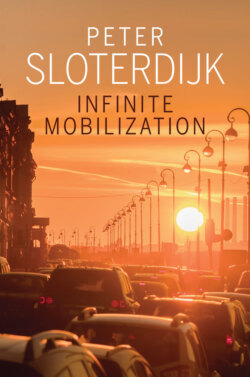Infinite Mobilization

Реклама. ООО «ЛитРес», ИНН: 7719571260.
Оглавление
Peter Sloterdijk. Infinite Mobilization
Contents
Guide
Pages
Dedication
Infinite Mobilization. Towards a Critique of Political Kinetics
Copyright page
Premises
Notes
1 THE MODERN AGE AS MOBILIZATION
The Mobilization of the Planet from the Spirit of Self-Intensification
Sketches towards an Outline of a Critique of Political Kinetics
The Prospect of an Asian Renaissance: Towards a Theory of the Ancient
Notes
2 THE OTHER CHANGE: ON THE PHILOSOPHICAL SITUATION OF ALTERNATIVE MOVEMENTS
Panicked Culture – or: How Much Catastrophe Does a Person Need?
The First Alternative: Metaphysics
The Second Alternative: Poeisis
Notes
3 EUROTAOISM?
Nothingness and Historical Consciousness: A Note on the World History of Life Fatigue
The Miscarried Animal and the Self-Birth of the Subject
Eurotaoism
Notes
4 THE FUNDAMENTAL AND THE URGENT – OR: THE TAO OF POLITICS Also a contribution to the answer as to why a credible politics currently does not exist
Dimensions of the Credibility Gap
The Voting Voice and the Body – or: How Politics Participates in the Crisis of Embodiment Metaphysics
From an Ethics of Principle to an Ethos of the Urgent
Notes
5 PARIS APHORISMS ON RATIONALITY
All That is Right
Diplomats as Thinkers in Destitute Times
Low Theory
La chose la mieux partagée du monde
Geometry as Finesse
Unconcealment and Tolerability
Of the Foolishness to Not be an Animal
Invent Yourself!
Notes
6 AFTER MODERNITY
The Age of the Epilogue
The Interim – or: The Birth of History from the Spirit of Postponement
Truth and Symbiosis: On the Geological Sublation of World History
For an Ontology of Still-Being
Notes
POLITY END USER LICENSE AGREEMENT
Отрывок из книги
In memory of Jacob Taubes
Translated by Sandra Berjan
.....
This kind of critique has so far only existed in the form of theology. Theologians have enjoyed the prerogative to critique the world as such in the name of an Other that is superior to the world, so that that which is one’s own was also subject to criticism. In this book, I attempt to repeat a critique of this kind in a non-theological way. This presupposes that the critical spirit can break away from the world to distance and transform what is one’s own, nearest and self-intended, too. Such a critique explodes the cynical-melancholy notion of a fallen world, one that nowadays sells itself everywhere as post-modern acceptance. It also eschews masochistic total contemplation, which leads to a metaphysical “drop-out-ism.” Neither escapist nor in agreement, the goal of alternative critique is to advance a critical theory of being-in-the-world. It would become plausible in the moment it successfully indicated a non-theological space for distance from the world – opened up a transcendence for the purpose of methodology, if you will. I am of the opinion that we are at the beginning stages of such a theory. Its center forms an analytics of coming-into-the-world2 where the position of philosophical anthropology that humans are “here” loses its validity – we may no longer carelessly assume that “existence” and “being-in-the-world” can be attributed to humans. The presumption that “human beings” are already “in the world” and “exist” becomes corrected by a Socratic maieutic method that deals with arriving on earth and generating worlds, as well as the risk of failure associated with both efforts. What was previously considered to be existential philosophy becomes transformed into a cosmology of the individual – each birth is a chance for a world to sprout up. Maieutic philosophy speaks of the exertion that actually emerging individuals must generate in order to be there. What is thus brought into discussion follows the movement of the life that comes into the world. In this way, the maieutic method once again speaks a serious language – a dramatic world language about the commonly inevitable.
As we will see, only trace elements of these kinds of reflections have previously been available to us in an explicit way – elements that inhabit the space between Heidegger and Bloch, Cioran and Lao Tzu (a space that is barely still surveyed or even perceived). Nevertheless it must be said – to avoid creating confusion – that the explicit elements of the following will appear obscure without the implicit. The reflections steer towards the thesis that the idea of critique without reserves against the unreasonable demands of the world will remain hollow. The question of whether a critical theory is still possible depends on resolving the problem of whether an enlightened a-cosmism may not be a necessary mode of lucid life.3
.....